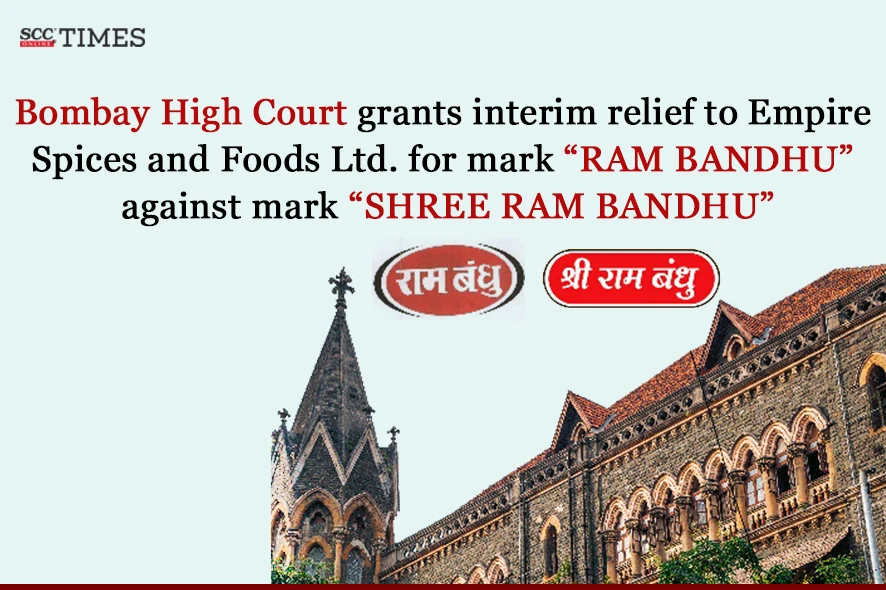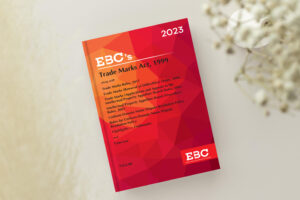Bombay High Court: An interim application was filed by Empire Spices and Foods Ltd. (applicant), wherein an interim injunction was sought against the respondent for alleged infringement of the registered trade mark “RAM BANDHU”, associated artistic copyright, and passing off. A Single Judge Bench of Sharmila U. Deshmukh, J., granted interim relief to the applicant, noting the deceptive similarity between the applicant’s registered trade mark “RAM BANDHU  ” and the respondent’s mark “SHREE RAM BANDHU
” and the respondent’s mark “SHREE RAM BANDHU  ”. The Court held that the applicant had established a prima facie case of infringement under the Trade Marks Act, 1999 (the ‘Act’) and reiterated the principle that copying the essential features of a registered mark amounted to infringement, even when an additional element, such as the prefix “SHREE”, was present.
”. The Court held that the applicant had established a prima facie case of infringement under the Trade Marks Act, 1999 (the ‘Act’) and reiterated the principle that copying the essential features of a registered mark amounted to infringement, even when an additional element, such as the prefix “SHREE”, was present.
Background:
The trade mark “RAM BANDHU” was coined in 1972 and used extensively in relation to spices, papad, pickle and other food products. The registration of mark “RAM BANDHU” was applied in 1993 and subsequently in 2012 under various trade mark registration numbers, with user claims dating back to 1972. In 2018, the applicant merged with Rambandhu Masalewale (P) Ltd. under order of National Company Law Tribunal (‘NCLT’), where, the applicant had taken over as subsequent proprietor of the mark. The applicant further alleged that he was the owner of the artistic work “RAM BANDHU” in both Hindi and English, which was created in 2002. It claimed that the work had gained wide market reputation, was endorsed by renowned celebrities, and had achieved a turnover exceeding Rs 250 crore.
In 2014, the applicant noticed the respondent’s mark “SHREE RAM BANDHU” and issued a cease-and-desist notice. Upon conduct of market search, the respondent’s goods were not found in the market, and it was assumed that the respondent had discontinued the use of its mark. However, in 2023 the applicant came across the respondent’s goods under the impugned mark “SHREE RAM BANDHU” which led to issuance of further notices. It was further submitted that the respondent’s mark was structurally, visually, phonetically, and deceptively similar to the applicant’s mark. It was also alleged that the respondent had copied the underlying artistic work, and the use of the words “RAM” and “BANDHU” by the respondent indicated a dishonest adoption of the applicant’s mark.
The respondent contested the claim, asserting that the use of the label had been honest and bona fide, as he was an ardent devotee of Lord Ram. He further argued that it was a common practice in India to use the names of deities in business and on products and claimed to have used the label continuously since 2003—2004. He further submitted that the applicant could not claim exclusivity over the name of the deity, which was a settled position in law. He argued that he had not applied for registration of a word mark, but rather a device mark, and contended that Section 17 of the Act prevented the applicant from claiming exclusivity over a part of the registered device mark. He further asserted that the delay and acquiescence militated against the grant of interim relief, as the first cease-and-desist notice had been issued earlier, pursuant to which no action had been taken.
Analysis and Decision:
The Court observed that the records of the Trade Mark Registry had prima facie established the applicant as the subsequent proprietor of the registered mark. The Court further noted that the respondent’s mark, with the prefix “SHREE” added to the words “RAM BANDHU”, had been written identically and in the same colour, making it deceptively similar like the applicant’s registered device mark, an act that could not have been a mere coincidence. The Court noted that the adoption of an identical or deceptively similar trade mark indicated a dishonest intention on the part of the respondent to come as close as possible to the applicant’s registered trade mark. The Court emphasised that it was well settled that rival marks had to be viewed from the perspective of the average consumer with imperfect recollection, and the question that begged consideration was whether such a consumer would have been in a state of wonderment and confusion upon encountering the two marks.
The Court relied on Jagdish Gopal Kamath v. Lime & Chilli Hospitality Services, 2015 SCC Online Bom 531, wherein a similar argument of absence of right to claim exclusivity on part of device mark was raised. The Court emphasised that, since the mark was registered as a device mark, no rights could be claimed over any part of the trade mark that was not registered separately. The Court further held that exclusivity could not be claimed over the name of the Hindu God “Lord Ram”, however, if the respondent attempted to distinguish between a device mark and a word mark on the assumption that the applicant’s mark, being a device mark, then it did not confer exclusivity over the words forming part of it.
The Court referred to the Supreme Court’s decision in Pidlite Industries Ltd. v. Jubilant Agri and Consumer Products Ltd, 2014 SCC Online Bom 50, wherein it was held that registration of a composite mark conferred monopoly over the trade mark as a whole, not over each constituent part and the Court had to examine the mark as a whole and determine its prominent or essential features for protection. The Court noted that the applicant was entitled to protect its essential features and when there was no other distinctive or prominent feature apart from the words, as in the mark “RAM BANDHU”, the entirety of the mark had to be protected. Since there was no distinguishable part of the whole, Section 17 of the Act applied, and it was no defence to say that the words were not registered separately.
Further, the Court referred to Bhole Baba Milk Food Industries Ltd. v. Parul Food Specialities (P) Ltd, 2011 SCC Online Del 4422, and held that the applicant’s device mark was not solely the name of a deity but a combination of two common words “RAM” and “BANDHU”. It ruled that exclusivity could not be claimed over these words individually, but when combined, the name lost its religious significance and became registrable. The suffix “BANDHU” made the difference. The Court held that the combination of these two words “RAM” and “BANDHU” was a coined word and arbitrary adaption being totally unconnected with the goods marketed under the trade mark, gave rise to claim for exclusivity.
The Court further observed that mere delay could not bar the grant of injunction in trade mark infringement cases. It held that a mere failure to sue, without any positive act of encouragement, was no defence and did not amount to acquiescence and a respondent who had infringed the applicant’s mark with knowledge of it could not later complain when sued.
The Court held that the respondent’s mark was not the standalone name of Lord Ram but the coined word “RAM BANDHU”, and a prima facie case had been established that the applicant had the exclusive right to use the device mark “RAM BANDHU”. The Court further held that if interim relief was not granted, irreparable harm and loss would be caused to the applicant as the respondent’s trade label was deceptively similar and likely to cause confusion, indicating association and diluting the applicant’s goodwill.
The Court granted interim relief and till the final disposal of the suit, restrained the respondent by an order and injunction from using the impugned mark ‘SHREE RAM BANDHU’ and/or any mark which was identical or phonetically/deceptively similar to the applicant’s mark ‘RAM BANDHU’ in any manner whatsoever, to infringe upon the applicant’s mark ‘RAM BANDHU’. Further, the Court allowed the request to stay the order for the period of four weeks.
[Empire Spices and Foods Ltd. v. Sanjay Bhimraoji Deshmukh, 2025 SCC OnLine Bom 2559, decided on 30-6-2025]
Advocates who appeared in this case :
For the Applicant/Plaintiff: Pranshul Dube, Asma Nadaf
For the Respondent/Defendant: Amit Jamsandekar, Archita Gharat, Vighnesh Kamat i/by Shoeb Parkar








